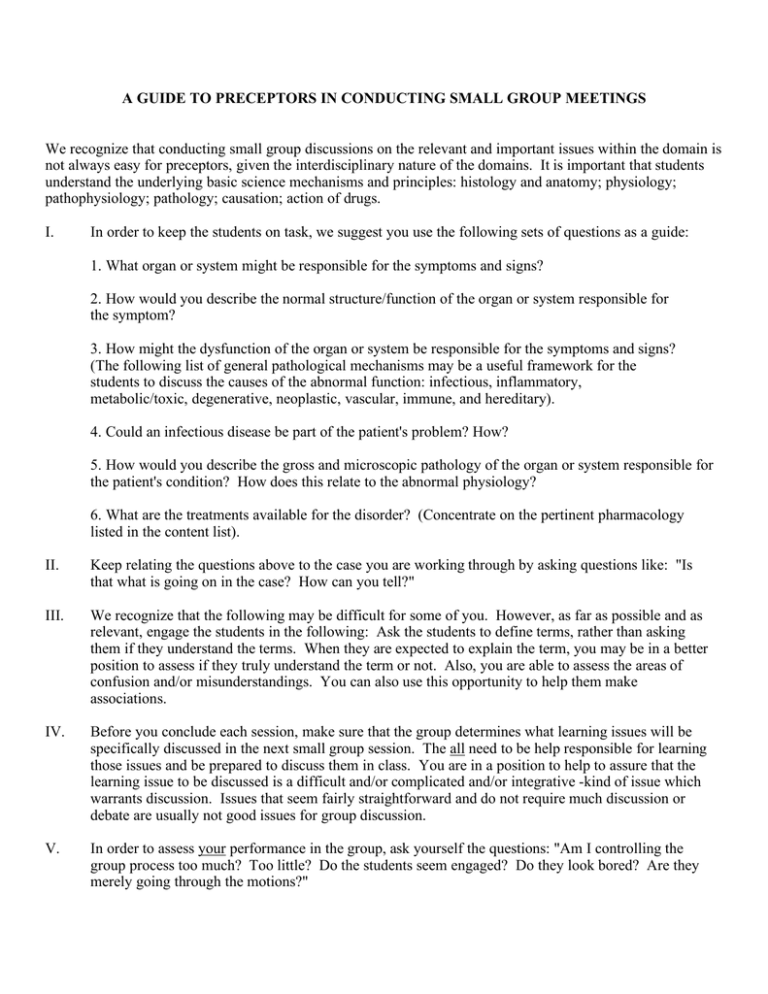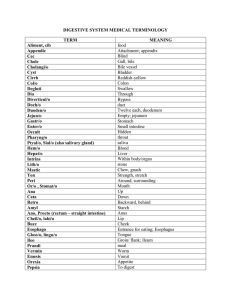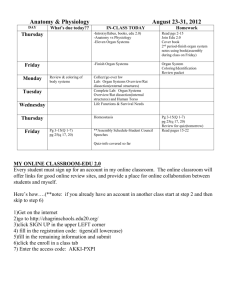Questions Handout
advertisement

A GUIDE TO PRECEPTORS IN CONDUCTING SMALL GROUP MEETINGS We recognize that conducting small group discussions on the relevant and important issues within the domain is not always easy for preceptors, given the interdisciplinary nature of the domains. It is important that students understand the underlying basic science mechanisms and principles: histology and anatomy; physiology; pathophysiology; pathology; causation; action of drugs. I. In order to keep the students on task, we suggest you use the following sets of questions as a guide: 1. What organ or system might be responsible for the symptoms and signs? 2. How would you describe the normal structure/function of the organ or system responsible for the symptom? 3. How might the dysfunction of the organ or system be responsible for the symptoms and signs? (The following list of general pathological mechanisms may be a useful framework for the students to discuss the causes of the abnormal function: infectious, inflammatory, metabolic/toxic, degenerative, neoplastic, vascular, immune, and hereditary). 4. Could an infectious disease be part of the patient's problem? How? 5. How would you describe the gross and microscopic pathology of the organ or system responsible for the patient's condition? How does this relate to the abnormal physiology? 6. What are the treatments available for the disorder? (Concentrate on the pertinent pharmacology listed in the content list). II. Keep relating the questions above to the case you are working through by asking questions like: "Is that what is going on in the case? How can you tell?" III. We recognize that the following may be difficult for some of you. However, as far as possible and as relevant, engage the students in the following: Ask the students to define terms, rather than asking them if they understand the terms. When they are expected to explain the term, you may be in a better position to assess if they truly understand the term or not. Also, you are able to assess the areas of confusion and/or misunderstandings. You can also use this opportunity to help them make associations. IV. Before you conclude each session, make sure that the group determines what learning issues will be specifically discussed in the next small group session. The all need to be help responsible for learning those issues and be prepared to discuss them in class. You are in a position to help to assure that the learning issue to be discussed is a difficult and/or complicated and/or integrative -kind of issue which warrants discussion. Issues that seem fairly straightforward and do not require much discussion or debate are usually not good issues for group discussion. V. In order to assess your performance in the group, ask yourself the questions: "Am I controlling the group process too much? Too little? Do the students seem engaged? Do they look bored? Are they merely going through the motions?" VI. In order to assess the performance of the group, ask the group: "How do you think we are doing? Does this process feel helpful? Should we change anything? If yes, what should change?" Pat Alguire, M.D. 11/15/93






